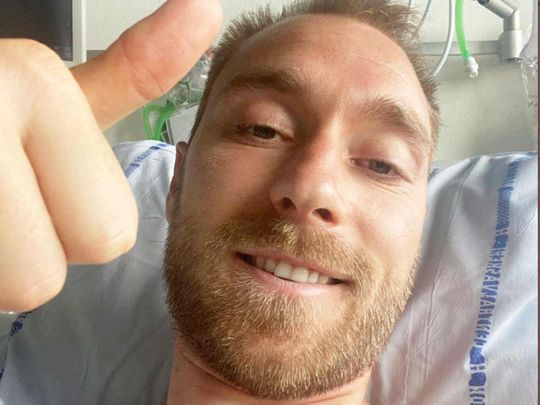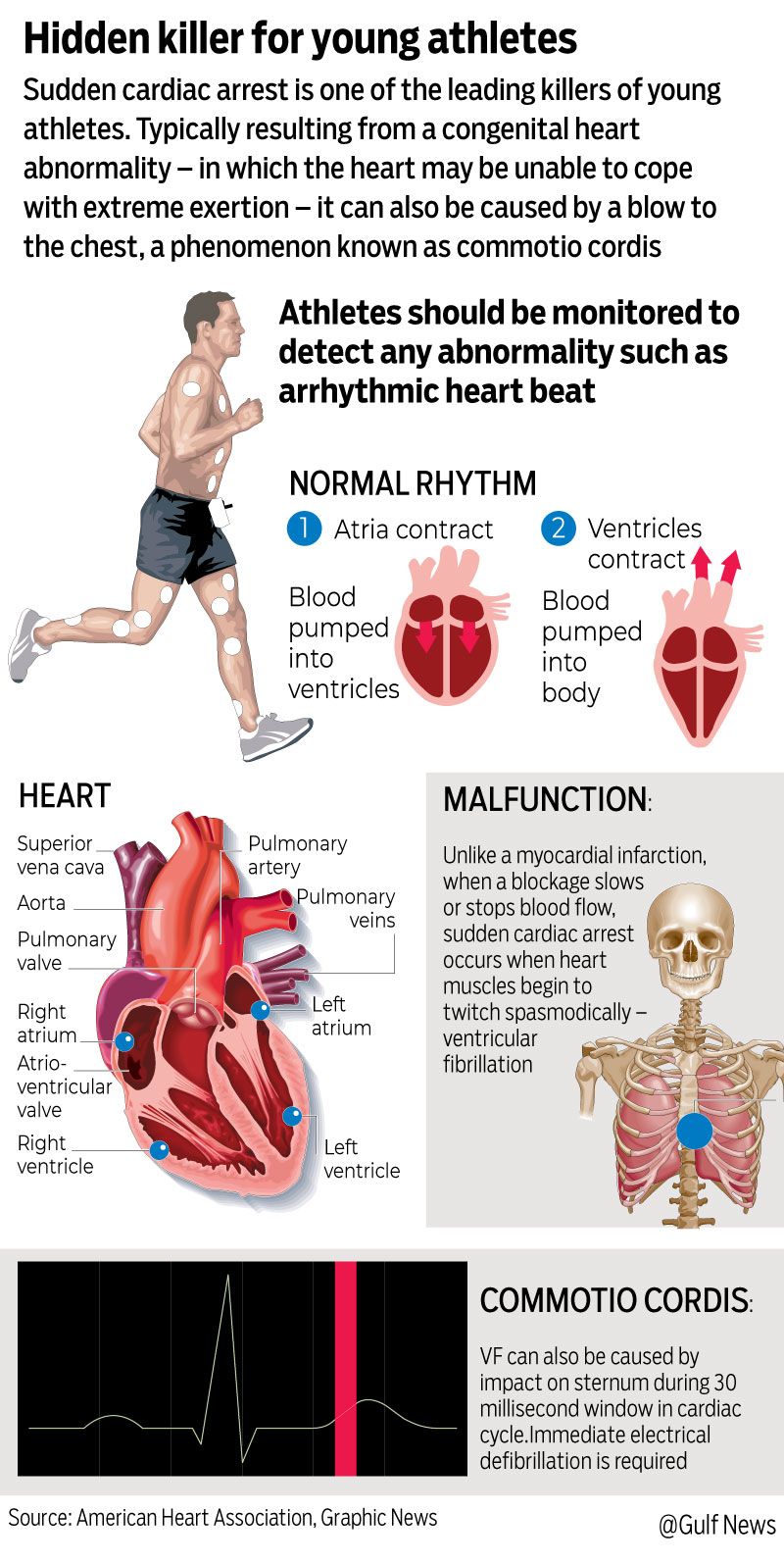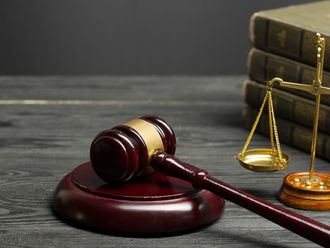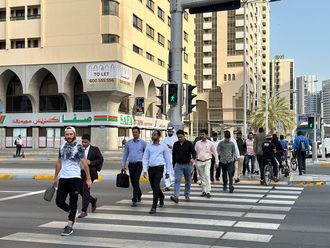
Christian Eriksen, Denmark’s midfielder, suffered a heart attack and collapsed during the Euro 2020 football match against Finland in Copenhagen on Saturday (June 12, 2021). He was only 29. How can a finely tuned high-performance athlete have a heart attack? Apparently, good health and fitness are not enough to ward off cardiac problems.
Eriksen was lucky. First aid was on hand, and the medical team were able to revive him. The Dane is not the first footballer to have collapsed on the pitch with a heart issue. Several footballers have died, but Marc-Vivien Foé is the only player to die during an international football match: the Cameroonian died in the 2003 Confederations Cup tie against Colombia.

If the heart has the capacity for certain level of exertion, and an athlete or sportsperson constantly overworks it, then the chances of thickening of the heart muscle is higher.
In other sports, many have died in the playing arena following heart attacks; several others survived after receiving immediate medical attention. That tells us that the physical fitness of athletes does not bestow immunity from sudden cardiac arrest.
Medical experts say the sudden cardiac arrest is a leading cause of death among sportspersons in the prime of their careers. There are no warning signs, and the athletes collapse in the middle of training or during matches in most cases.
What’s a heart attack?
Like all muscles, the tissues in the heart too require oxygen to stay alive. A heart attack, or myocardial infarction (MI), occurs when part of the heart muscle is destroyed or damaged due to lack of oxygen.
Coronary arteries bring oxygen-laden blood to the heart muscle. The blood flow is severely reduced or cut off when the arteries are narrowed due to a build-up of fat, cholesterol, calcium, proteins, inflammatory cells and other substances, which are called plaque.
A heart attack can happen when the coronary artery contracts or goes into a spasm, affecting the blood flow to the heart muscle. A spontaneous tearing of the coronary artery wall can also trigger a heart attack.
Why do heart attacks occur?
Dr Amal A. Louis, an interventional cardiologist at Canadian Specialist Hospital, Dubai, told Gulf News that cardiomyopathy (enlargement of the heart) in young people can happen due to poor food choices, sedentary lifestyle, genetics, over-exercising. This not only bulks up body muscles but also thickens the heart muscle. Indiscriminate use of anabolic steroids affects all muscles, including the heart muscle.
A heart attack occurs when blood flow to the heart is blocked. It’s a blood circulation problem, according to the American Health Association. A heart attack can cause cardiac arrest.
A sudden cardiac arrest happens when the heart malfunctions and suddenly stops beating. The American Health Association calls it an electrical problem caused by irregular heart rhythms called arrhythmias. Death occurs within minutes after the heart stops.
Why sudden cardiac arrest can be fatal
It occurs when the normal rhythm of the heart is disrupted, and the heart stops pumping blood. Since sudden cardiac arrest generally happens without warning, immediate medical attention is imperative, or else death or severe disability will occur.
Dr Louis says: “In such situations, a person can experience sudden fibrillation where instead of the steady contraction and expansion (rub-dub rhythm), the heart has a sudden twitching, which is described as fibrillation owing to a disruption in the electrical rhythm. This can cause cardiac arrest. A patient will have to be revived with immediate CPR or defibrillation.”
Why does sudden cardiac arrest strike active sportsperson?
Structural or electrical abnormalities can cause sudden cardiac arrest in sportspersons. These abnormalities may be inherited or must have remained undiagnosed. For athletes with an abnormal heart condition, exercise can be a trigger. In some sport, a hard blow to the chest can result in sudden cardiac arrest, and it is called “commotio cordis.”
Dr Louis says: “Nowadays, cardiac arrests strike people who are very fit, following a healthy and active lifestyle, because of more physical exertion. If the heart has the capacity for a certain level of exertion, and an athlete or sportsperson constantly overworks it, then the chances of thickening of the heart muscle are higher.”
How high is the risk?
According to the Sports Institute at UW Medicine (University of Washington) in Seattle, 1 or 2 in every 100,000 active sportspersons experience sudden cardiac arrest each year. Males are at greater risk than females, and African American athletes are at greater risk than Caucasian athletes, the institute says.

Is it possible to avert a sudden cardiac arrest?
So far, no method has been entirely reliable in anticipating heart issues in sportspersons. All high-performance athletes are evaluated constantly. And in the case of professional footballers like Eriksen, the clubs carry out sophisticated medical evaluations, and the players’ fitness is continually monitored.
Since medical evaluations may not help uncover underlying health issues, some experts insist on electrocardiogram (ECG) screenings to detect heart abnormalities that could elevate the risk of sudden cardiac arrest.
Dr Louis says Automated Electric Defibrillator (AED) devices are increasingly being installed in malls, gyms, schools, community hots-spots and other public places. But it is essential to have knowledge of CPR and defibrillation to save a life, he adds.
What are the warning signs of a sudden cardiac arrest?
As the name suggests, sudden cardiac arrest strikes sportspersons without any warning. Yet, there are some signs that may help uncover heart conditions which could lead to a sudden cardiac arrest.
According to UW Medicine’s The Sports Institute, the signs include:
- Fainting spell during exercise
- Chest pain while exercising
- Excessive shortness of breath during exercise
- Unexplained palpitations
- Unexplained seizures
What happens after cardiac arrests?
If the heart muscle has thickened and the patient suffers an episode like Eriksen, an Implantable Cardioverter Defibrillator (ICD) is the answer. It’s a box-like device implanted subcutaneously with a wire plugged into the heart. If the ICD detects heartbeats are slowing down, it acts as a pacemaker and accelerates the heartbeat to restore a steady normal rhythm. If it detects a sudden electrical irregularity in the rhythm that might lead to a cardiac arrest, it will act as an internal defibrillator sending an electric shock to revive the heart, Dr Louis says.
In both, cases any individual who has this device implanted will have to end contact sport and be under the medical guidance of a cardiologist,” Dr Louis says.
Danish football team’s doctor Morten Boesen, in a statement on Thursday, has said Eriksen would be implanted with a heart starter device (ICD). “Christian has accepted the solution, and the plan has moreover been confirmed by specialists nationally and internationally who all recommend the same treatment,” Boesen added.
■ Do not over-exercise
■ Avoid unregulated anabolic steroids, if you are an athlete. These might bulk up your heart muscles too while bulking you up, and that can be fatal.
■ Regularly screen for any heart anomalies, if you have a history of cardiac diseases in the family.
■ Do six-monthly blood work to check your triglycerides and LDL cholesterol level, as well as heart check-up that could flag off any irregular electrical rhythms or thickening of the heart muscle.
■ If you are diagnosed with the heart of an “ox”, do not exert too much. Invest in an Automated Electric Defibrillator and train your family on advanced CPR.
■ Ensure that your gym or exercising studio has an AED device.
Footballers who suffered heart attacks on the pitch
Fabrice Muamba
In March 2012, the former Bolton Wanderers player suffered a cardiac arrest on the pitch during an FA Cup quarter-final against Tottenham Hotspur. Muamba’s heart stopped for 78 minutes, but he recovered after paramedics administered 26 defibrillator shocks to him. Following medical advice, the midfielder, born in Zaire and who moved to England when he was 11 and had spells with Arsenal and Birmingham City before joining Bolton, announced his retirement from professional football five months later.
Iker Casillas
While plying his trade at FC Porto, the 37-year-old goalkeeper collapsed during a training session on May 1, 2019. He was rushed to hospital, where they discovered the Spaniard had suffered an acute myocardial infarction. Casillas had a decorated career — he won the World Cup and two European Championships with Spain. At Real Madrid, he won five Spanish titles and three UEFA Champions Leagues, but he decided to retire from football the following month following the frightening incident.
Bafetimbi Gomis
The French striker was popular among English fans for his time at Swansea, where he scored several memorable goals. But he had a medical condition and collapsed on several different occasions. Still, he has continued with his career and is currently at Saudi Arabia’s Al-Hilal, where he was crowned the Saudi Pro League top scorer for the 2020-21 season after grabbing 24 goals. He played a huge part in securing the team’s 17th league title.
Abdelhak Nouri
The young midfielder, regarded as one of the brightest talents in the game, collapsed while playing in a friendly for Ajax against Werder Bremen in 2017. There was no defibrillator on hand, and he suffered permanent brain damage due to a lack of oxygen. He was airlifted to hospital and went into a coma, and it would be almost three years before he would come out of it.
Khalilou Fadiga
The Bolton midfielder collapsed before a Carling Cup tie against Tottenham in 2005. The 29-year-old was carried off the pitch on a stretcher and rushed to the hospital. He had undergone major heart surgery five months earlier and had to be fitted with a defibrillator due to an irregular heartbeat. He was advised to retire from the game but would make five more appearances for Bolton before hanging up his boots.
Marc-Vivien Foe
While playing for Cameroon in 2003 against Colombia, he collapsed after 72 minutes. When medical teams could not resuscitate him, he was carried off on a stretcher and taken to the stadium’s medical centre to receive oxygen but died soon after. An autopsy revealed he had hypertrophic cardiomyopathy, a hereditary condition that can increase the risk of sudden death during exercise.
Cheick Tiote
In 2017, the 30-year-old midfielder fainted during a training session with his new Chinese club, Beijing Enterprises, whom he had joined from Newcastle United just four months earlier. The Ivorian died in hospital, having played just 11 games for his new team. He’ll always be remembered for his brilliant goal in Newcastle’s unforgettable four-goal comeback against Arsenal.








